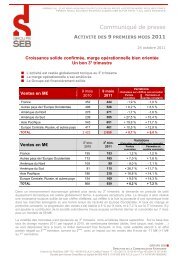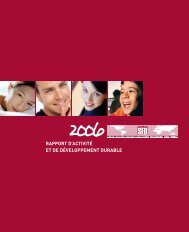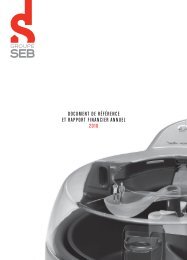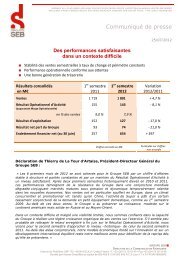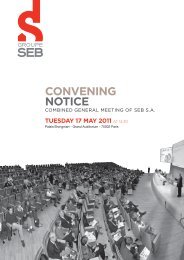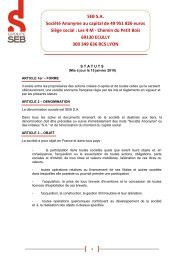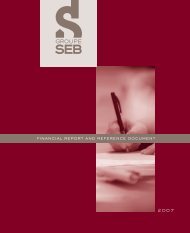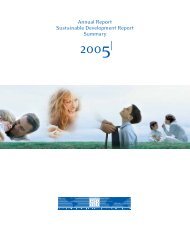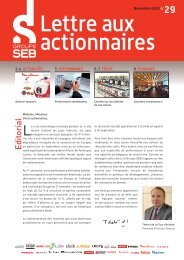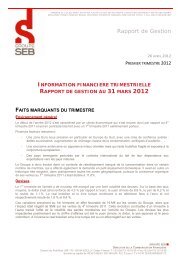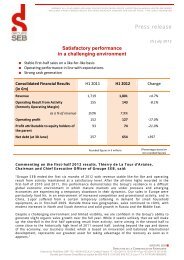financial report and registration document 2011 - Groupe SEB
financial report and registration document 2011 - Groupe SEB
financial report and registration document 2011 - Groupe SEB
You also want an ePaper? Increase the reach of your titles
YUMPU automatically turns print PDFs into web optimized ePapers that Google loves.
IFRIC interpretation no. 6 adopted by the European Union in a regulation<br />
published in the Offi cial Journal of the European Communities on 27 January<br />
2006, which was early adopted by <strong>Groupe</strong> <strong>SEB</strong> in 2005, states that no<br />
provision is required for historical waste, other than in respect of recycling<br />
costs incurred during the reference period. As these costs are or will be offset<br />
in most countries by an environmental charge payable by the consumer until<br />
<strong>2011</strong>, the net cost of recycling historical waste will not have a material impact<br />
on the Group’s income statement.<br />
Concerning the treatment of products put on the market after the date of<br />
transposition (13 August 2005 in the case of France), the directive states<br />
that producers are individually responsible for guaranteeing fi nancing for the<br />
recovery <strong>and</strong> recycling of the related waste.<br />
To meet these obligations, <strong>Groupe</strong> <strong>SEB</strong> has joined collective pay-as-yougo<br />
schemes similar to those in place for fi nancing historical waste. These<br />
schemes are managed by coordinating organisations, such as Eco-Systèmes<br />
SAS in France, in which <strong>Groupe</strong> <strong>SEB</strong> plays an active role.<br />
The <strong>financial</strong> guarantees generally take the form of advances to these<br />
organisations, based on the expected costs. While joining these schemes<br />
does not exempt <strong>Groupe</strong> <strong>SEB</strong> from its individual liability, no provision (within<br />
the meaning of IAS 37) is recognised as new products are brought to market,<br />
because a producer can withdraw from the market concerned without<br />
having to individually fulfi l its guarantee obligations, leaving the remaining<br />
producers to jointly cover the costs of recycling. For this reason, provisions<br />
NOTE 30 RELATED PARTY TRANSACTIONS<br />
Financial Report <strong>and</strong> Registration Document <strong>2011</strong><br />
5<br />
Consolidated fi nancial statements<br />
Notes to the consolidated fi nancial statements<br />
are recognised not when a product is introduced but when it has been on the<br />
market during the period of reference. The provisions recorded corresponded<br />
solely to the payment notices issued by the above organisations relating to<br />
the Group’s contributions. These organisations can make adjustments during<br />
later periods based on the actual amounts of the Group’s contributions.<br />
Costs of recycling “new waste” are expected to rise in the coming years with<br />
the probable increase in return rates <strong>and</strong> gradual introduction of recycling<br />
schemes. These costs will also refl ect average product life cycles, changes<br />
in sorted collection logistics costs <strong>and</strong> technological improvements related<br />
to product design <strong>and</strong> recycling techniques.<br />
Statutory employee training rights<br />
Employees of <strong>Groupe</strong> <strong>SEB</strong> in France with permanent contracts are entitled to<br />
20 hours’ training per year, which may be carried forward for up to six years.<br />
If all or part of this entitlement is not used within six years, it is capped at 120<br />
hours. The costs of supplying training as a result of this entitlement <strong>and</strong> of the<br />
training allowances paid to employees who follow courses outside working<br />
hours are covered by the employer. As the decision to incur these costs is<br />
made by Group management <strong>and</strong> they relate to employee services to be<br />
received in future periods, they are expensed as incurred. At 31 December<br />
<strong>2011</strong> the total amount of unused training hours accumulated by <strong>Groupe</strong><br />
<strong>SEB</strong> employees stood at 586,980 versus 590,810 at 31 December 2010 <strong>and</strong><br />
593,294 at 31 December 2009.<br />
Note 30.1. TRANSACTIONS WITH ASSOCIATES AND NON-CONSOLIDATED COMPANIES<br />
The consolidated fi nancial statements include transactions carried out in the normal course of business with associates <strong>and</strong> non-consolidated companies.<br />
All of these transactions are carried out on arm’s length terms.<br />
(in € millions) <strong>2011</strong> 2010 2009<br />
Revenue<br />
Other income<br />
Purchases<br />
4.4 2.8 1.8<br />
Other non-current fi nancial assets 0.4 0.2<br />
Trade receivables<br />
Trade payables<br />
2.6 0.7 0.2<br />
GROUPE <strong>SEB</strong><br />
5<br />
131



